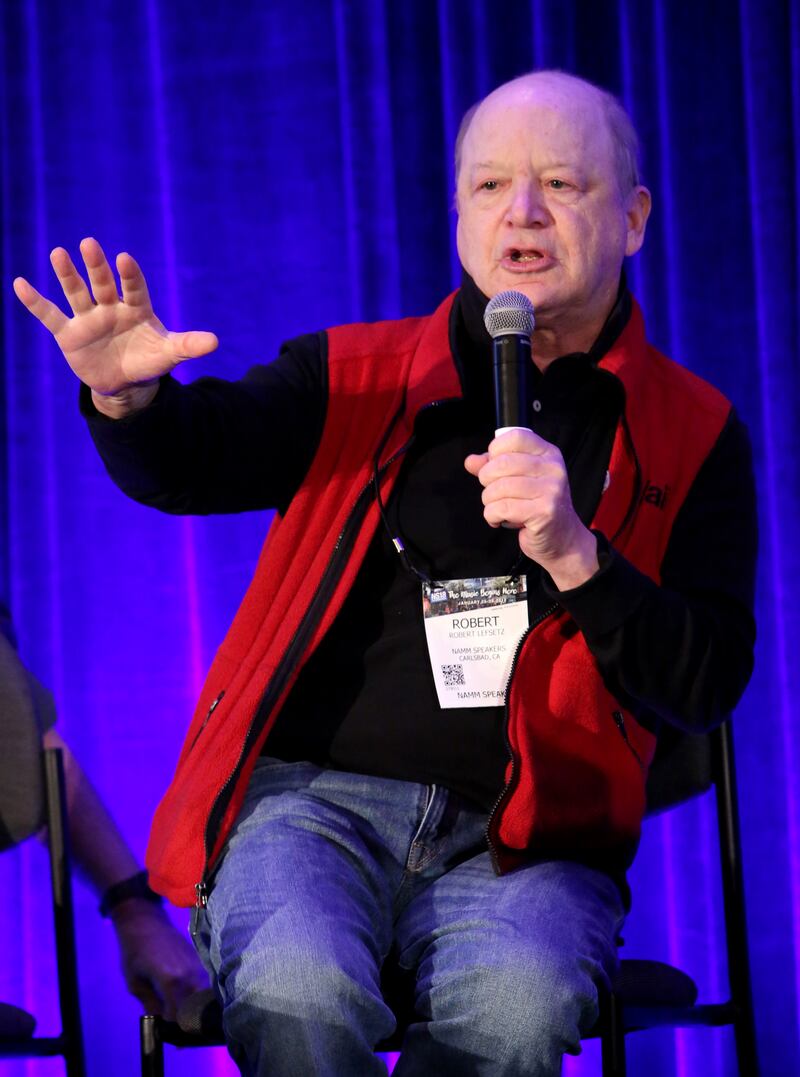Paula Franceschi is a 71-year-old electric guitarist who took a 25-year “hiatus” as a top marketing executive in Hollywood to make money before returning to music 10 years ago. She made it to the main stage of the House of Blues in 2014 at age 67.
Franceschi is one of thousands of subscribers to music blogger Bob Lefsetz’s almost cult-like newsletter. She was stoked when, starting Jan. 29, the Lefsetz Letter unwittingly became the first place for women in the music industry to share stories of harassment and rape.
Lefsetz included one of her comments in a subsequent newsletter as more women (and some men) wrote impassioned accounts to him, kicking up one of the biggest storms in the music industry since a blockbuster report on harassment at record companies published in the Los Angeles Times all the way back in 1991.
“The music business can be filthy to the bone,” Franceschi told The Daily Beast. “Women don’t have it easy and don’t want to lose what little they have. But the good news is thanks to what Bob’s putting out there, the men are fucked. It’s over. They better cash in their options now because we’re coming for them. Bob is like an accidental hero. He’s the kind of example we need out there, men stepping up for women.”
In addition to messages about specific sexual misconduct sent to Lefsetz, women in the music industry like Stacy Waronker, who’s managed Third Eye Blind and Troye Sivan, wrote to explain why she and her colleagues had been slower to speak out than their counterparts in Hollywood.
“Women are taught that you need to be able to ‘hang’ with the guys if they want to make it in this industry,” Waronker wrote. “And by whistleblowing in the industry, even for men who truly deserve it, we fear our repercussions. Because the terrible men in the music industry are still much stronger than this movement. At least for now. It’s exhausting. Our jobs are hard enough without having to constantly dodge advances and question intentions. It’s not right, it’s not fair, but I understand why my peers are mum. It still just doesn’t seem smart or safe or ‘worth it’ to speak up.”
The emails kept coming, some signing off with “Name Withheld for Fear of Retribution” or “Name Withheld—because I’m still afraid.” One anonymous writer detailed her experience at a SXSW cocktail party following a performance by “one of the most major Latin artists in modern music.” She was an industry neophyte at the time.
“I was attempting to get some facetime with this artist’s manager, as I’d been communicating with him for weeks about a potential partnership,” she wrote. “Instead, this manager got extremely drunk, pulled his pants down and put his ass in my face, and made jokes about how it would be ‘hot as shit’ if I took my glasses off in slow motion like they do in the movies. Again, I laughed it off. I was maybe 23 or 24? I didn’t know what else to do. Was I supposed to slap one of the most powerful music managers in the world across the face in front of a room full of people who respected him more than me?”
A female management rep recalled her thrill at getting a meeting with an industry “titan” when she was working with a “Grammy Award winning, multi-hit, all male veteran act.” She and the band met with the guy. She was a good 10 years younger than all of them. Within 15 minutes, she wrote, he and the band began joking about the reasons they got in the business—“to get pussy of course.” The industry titan then turned to look at her and “staring directly at me, says, and there’s NOTHING like fresh pussy.”
The band laughed it off and she said she tried to as well but felt humiliated and diminished.
“No One is Listening to These Women,” Lefsetz titled his Feb. 6 newsletter.
Now they are.
“I can’t think of any man in the industry right now that’s not terrified of what some woman will say about a relationship they had in the last 30 years,” Ed Steinberg, a longtime music video producer who made Madonna’s first video “Everybody” in 1982, told The Daily Beast Friday.
Lefsetz, however, may be less thrilled with his sudden and unlikely role as a vessel for female whistleblowers in music. Unlike, say, Jodi Kantor and Megan Twohey of The New York Times or Ronan Farrow of The New Yorker, Lefsetz posted accusations without the backing of a major news organization and without apparently checking with the accused beforehand.
As a result, at least one of the men named in the Lefsetz Letter is fighting back with a team of three attorneys claiming the allegations were published with a “reckless disregard for the truth.” The legal blowback is threatening to dwarf Lefsetz’s nascent movement, with some in #MeToo claiming it’s a red herring effort to shut up women in music before they can say more.
“You think Hollywood is bad?” said one female record producer. “It’s a garden club compared to the guys who run the music industry. These thugs are not gonna go quietly.”
Lawyers for Lefsetz, though, fought back in an email sent to his subscribers Friday, claiming Lefsetz is not in the journalism business, has every right to post third-party comments and won’t be cowed into retracting any of his newsletters.
It all began on Jan. 29 when Lefsetz, 64, a former music entertainment lawyer, published an open letter to Charlie Walk, the president of Republic Records and a judge on Fox’s The Four: Battle for Stardom, by a former employee named Tristan Coopersmith. The letter originally appeared on a women’s health and fitness site called Life Lab. Lefsetz said Walk should be “bounced” from his TV job after reading her letter.

Veteran music writer Bob Lefsetz.
Jesse Grant/GettyCoopersmith said Walk hired her at age 27 and promised her that she could run her own department. He made her feel, she wrote, “like a unicorn.” But plans for her to become an executive evaporated. Instead, she said, the married Walk subjected her to repeated lewd comments and texts and took her to dinners where he, among other things, put his hand on her thigh, edging it close to her “sacred place.” She alleges he once cornered her at a party at his own apartment and pushed her onto the bed in their bedroom. Because he was drunk—and short—Coopersmith said she managed to escape.
“I’m not sure this demands additional comment,” Lefsetz wrote when he posted her note, “but I will say the music business has been curiously quiet when it comes to #metoo and I wonder why, is it because it’s essentially an independent contractor business, one wherein everybody’s too afraid of damaging future relationships to speak up?
“For a notoriously freewheeling business,” Lefsetz added, “It’s been strangely noiseless.”
The sound was about to be turned up.
Walk was placed on leave by Republic, a subsidiary of Universal Music Group, on Jan. 31 pending an investigation and withdrew from The Four on Feb. 1.
“Out of respect for the contestants, my fellow judges and everyone involved with the show, I have made the decision not to attend the finale of The Four,” Walk said in a statement. “I do not want my presence to be a distraction. Needless to say this is very upsetting… Although I continue to support the ‘Me Too’ movement, there has been an extreme rush to judgment against me in this particular case which is unfair and inconsistent with anything that even actually happened.”
Lefsetz continued to churn out more email blasts, with a few people praising Walk but many more burying him.
Harvey Leeds, who spent 35 years as a high-ranking executive at Sony Music & Entertainment, helping shepherd the careers of Cyndi Lauper, Gloria Estefan, Culture Club, Pearl Jam, and Rage Against the Machine among others, was particularly incensed with Walk, with whom he worked at Sony.
“I spoke to Sony HR twice about Mr. Walk even though he states no one ever complained to HR,” Leeds wrote in an email Lefsetz posted Feb. 1. “I was told if I wanted to pursue the complaint that Sony would tie me up in court for more than 3 years and freeze my paycheck.”
Walk’s attorney Thomas Clare sent Lefsetz a demand letter Tuesday telling him to retract and delete all the Walk posts in language that hinted at a possible defamation claim.
“It was especially reckless that, contrary to well-established journalistic standards and basic considerations of fairness, you did not even bother to contact Mr. Walk before publishing these false and damaging allegations and validating them with your own imprimatur,” Clare wrote. “Surely your readers would have been glad to know what has really been taking place, including a criminal report to the authorities.”
Clare’s letter contained a random twist first reported by the New York Post: On Feb. 5 Walk filed a complaint with the Manhattan district attorney’s office claiming that a former radio station owner named Tom Gilligan he knew 20 years ago had sent him a bizarre series of texts and voicemails in December threatening to “weaponize the #MeToo movement” against him unless he met his demands that somehow involved repairing his relationship with Jon Bon Jovi. He hinted he had women lined up to drop a dime on Walk.

Republic Records President Charlie Walk.
Jerod Harris/GettyA representative for the Times Up Legal Fund, which is representing Coopersmith, strongly denied any hint of conspiracy between Coopersmith and Gilligan, according to Variety.
Though many emails published by Lefsetz since Jan. 29 are supportive, he has also posted many which take issue with what he’s doing. Singer-songwriter Shari Ulrich was among several Lefsetz readers who called for caution. Ulrich said she was once raped at knifepoint in her thirties but never experienced harassment by her colleagues or bosses in the music industry.
“Now we ARE seeing consequences and that’s a great thing,” Ulrich wrote. “But the pendulum is swinging so far that due process has gone out the window. Any woman who has a bad date or a famous boyfriend who was a jerk, can state anonymously that they were abused and recklessly destroy someone’s hard earned career out of vengeance. That’s a very dangerous possibility.”
Ulrich told The Daily Beast that she fears “too many career-ending accusations with too little proof.”
“I’ve slept with a few of my musicians over the years,” she said. “And I was their boss, they were in my band. If I’d been sloppy about it and one of them turned into an enemy and wanted to come after me it could look bad. I really feel for Bob and how he’s opened the door for everyone to tell their stories but it’s not to say everyone will be true and fair.”
Steve DeBro, a former vice president of Atlantic Records, told The Daily Beast he was fortunate both to work “for a lot of powerful women who were at Atlantic when I was there” and was even mentored by a woman. But he knew harassment existed.
“But I’m glad that these stories are coming out,” he said, ”and the music industry is going through the same reckoning that many other parts of society are. A painful and healthy process that will make men think twice about using their leverage to act as predators.”
Which is kind of what Rose Gross-Marino who was, among other things, Clive Davis’ personal assistant and gatekeeper supreme at Arista Records, wrote to Lefsetz—often in CAPS.
“Speaking of #ME TOO, I want to share #NO MORE!” Gross-Marino wrote.
“Many men in the music industry don’t/didn’t treat/relate/see women as equals. My point here is to say it’s not just sexual abuse, it’s sexual misuse, sexual harassment and anything else that makes you uncomfortable or is demeaning TO YOU!…. PLEASE KNOW, IT’S NOT ONLY SEXUAL ABUSE! Those who know me, know I respect and love men! Fair men! Good men! This is not anti-men. This is anti-abuse. Yes men are also abused in many ways and some women are also guilty of these abuses. But overwhelmingly, it’s women. Don’t be forced out—ROAR OUT AND UP!”






